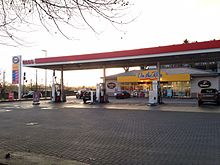German-American Petroleum Company
The German-American Petroleum Society ( DAPG ) is a German mineral oil company founded in 1890 , which has been called Esso since 1950 and Esso Deutschland GmbH since 1999 , and is a subsidiary of the US ExxonMobil Group.
history
DAPG was founded on February 25, 1890 in Bremen as a joint venture by the German merchants Franz Ernst Schütte , Carl Schütte and Wilhelm Anton Riedemann, as well as the American John D. Rockefeller from Standard Oil , to take over the petroleum business of Standard Oil in Germany operate.
In 1891 the petroleum import business was transferred from Edmund Siemers to DAPG. In the mid-1890s, DAPG took over half of the shares in Bremer Petroleum-Raffinerie (later Mineralöl-Raffinerie vorm. August Korff ).
At the beginning of the 20th century, petroleum was sold under the DAPOL brand and (American) gasoline under DAPOLIN with the famous Indian head. In 1904, the Standard Oil Company took over 50 percent of the shares in the company and relocated the company's headquarters to Hamburg .
After the Benzol Association had developed a super gasoline ( Bibo mixture ) by adding gasoline to its benzene in 1924 , a delivery exchange agreement with the DAPG enabled it to offer a super gasoline that was more knock-resistant by adding around 40% benzene : Duolin , which was sold as a red colored Esso from September 1928 . And 10% benzene was added to the dapolin to increase the knock resistance.
The DAPG tanker shipping company changed its name to Waried Tankschiff Rhederei in 1928 .
During the global economic crisis , the shares of MAN and Haniel in Oelhag went entirely to DAPG and Rhenania-Ossag . Also ARCO gave so many shares that the three companies were a third each shareholder.
1930 came into force in Germany the purchase regulation of potato alcohol for fuel purposes for all fuel companies. 2.5 percent by weight of the amount of fuel produced or imported was to be obtained from the Reich Monopoly Administration. This quota increased gradually to 10 percent by October 1932.
In 1931 DAPOLIN was renamed Standard Petrol .
In 1935, DAPG was the market leader in Germany among the big five petrol station chains with 18,327 filling stations (32.7%) and on a par with Rhenania-Ossag with a sales rate of 20.9%.
Around 1937/1938 the name of the Standard brand was changed to the ESSO brand : the manual for motor vehicle drivers that was published in 1937 with the Standard brand on the cover was given the new ESSO brand in the following edition .
Here, ESS O phonetically pronounced letter by S tandard O il.
In 1938, DAPG and Rhenania-Ossag took over half of Oelhag each with the help of their non-executable foreign exchange reserves. At that time, Standard Oil of New Jersey owned 94 percent of the shares in DAPG. As a result of the annexation of Austria in 1938 and the subsequent reorganization of the industry there, Vacuum Oel AG in Vienna and its refinery in Kagran were assigned to the DAPG.
With the conversion to the war economy in September 1939, all mineral oil sales companies were combined in the Mineral Oil Distribution Working Group (AMV) and only unbranded petrol was sold. The DAPG was still considered a "German company", was on the list of arms companies and was given preferential allocation of materials. Two directors of the company, Karl Lindemann and Emil Helfferich , were members of the Keppler circle , with contributions paid until 1944.
The DAPG operated a refinery in Bremen. In 1943 there were also holdings in the Hydrierwerke Pölitz AG in Pölitz near Stettin (together with IG Farben and Rhenania-Ossag).
DAPG was renamed Esso AG in 1950 and transformed into Esso Deutschland GmbH in 1999 .
The German petrol station network has belonged to the British EG Group of Mohsin Issa since October 1, 2018 .
Ships
The following list contains some of the tankers that were used by the DAPG tanker shipping company:
- Standard (built 1890)
- August Korff (tanker, built in 1894 by Joh. C. Tecklenborg ); first tanker steamer built at a German shipyard
- Hagen (built 1913); first sea tanker with diesel engine
- Jupiter (built 1914); was the largest tanker in the world when it was commissioned
See also
literature
- Joachim Kleinmanns: Great, full! A brief cultural history of the gas station. Jonas Verlag, Marburg 2002, ISBN 3-89445-297-8 .
- Rainer Karlsch , Raymond G. Stokes: Factor Oil. The mineral oil industry in Germany 1859–1974. Verlag CH Beck, Munich 2003, ISBN 3-406-50276-8 .
Web links
- Official presentation of the history of Esso in Germany
- Overview of road maps, including DAPG (at the bottom)
- Early documents and newspaper articles on the German-American Petroleum Society in the 20th Century press kit of the ZBW - Leibniz Information Center for Economics .
Individual evidence
- ↑ Handbook for Motor Vehicle Drivers, 5th edition 1937. Retrieved on February 10, 2013.
- ↑ a b Standard Oil Fuels World War II .
- ^ Rainer Karlsch, Raymond G. Stokes: Factor oil. The mineral oil industry in Germany 1859-1974 . Verlag CH Beck, Munich, 2003. p. 199.
- ↑ Sale completed: German Esso petrol station network is operated by EG | ExxonMobil Germany. Retrieved March 24, 2020 .
- ↑ Auke Visser: Private website with detailed information and fleet lists from 1873. Retrieved on December 30, 2018 .




